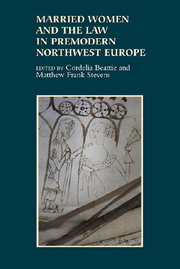Book contents
- Frontmatter
- Contents
- Figures and Tables
- Contributors
- Introduction: Uncovering Married Women
- 1 Inheritance, Property and Marriage in Medieval Norway
- 2 Spousal Disputes, the Marital Property System, and the Law in Later Medieval Sweden
- 3 When Two Worlds Collide: Marriage and the Law in Medieval Ireland
- 4 Married Women, Crime and the Courts in Late Medieval Wales
- 5 Peasant Women, Agency and Status in Mid-Thirteenth- to Late Fourteenth-Century England: Some Reconsiderations
- 6 London's Married Women, Debt Litigation and Coverture in the Court of Common Pleas
- 7 Married Women, Contracts and Coverture in Late Medieval England
- 8 Property, Family and Partnership: Married Women and Legal Capability in Late Medieval Ghent
- 9 ‘For His Interest’? Women, Debt and Coverture in Early Modern Scotland
- 10 The Worth of Married Women in the English Church Courts, c.1550–1730
- 11 Married Women, Work and the Law: Evidence from Early Modern Germany
- Index
Introduction: Uncovering Married Women
Published online by Cambridge University Press: 05 July 2013
- Frontmatter
- Contents
- Figures and Tables
- Contributors
- Introduction: Uncovering Married Women
- 1 Inheritance, Property and Marriage in Medieval Norway
- 2 Spousal Disputes, the Marital Property System, and the Law in Later Medieval Sweden
- 3 When Two Worlds Collide: Marriage and the Law in Medieval Ireland
- 4 Married Women, Crime and the Courts in Late Medieval Wales
- 5 Peasant Women, Agency and Status in Mid-Thirteenth- to Late Fourteenth-Century England: Some Reconsiderations
- 6 London's Married Women, Debt Litigation and Coverture in the Court of Common Pleas
- 7 Married Women, Contracts and Coverture in Late Medieval England
- 8 Property, Family and Partnership: Married Women and Legal Capability in Late Medieval Ghent
- 9 ‘For His Interest’? Women, Debt and Coverture in Early Modern Scotland
- 10 The Worth of Married Women in the English Church Courts, c.1550–1730
- 11 Married Women, Work and the Law: Evidence from Early Modern Germany
- Index
Summary
Why Married Women?
As a number of our contributors comment, particularly those writing on premodern Britain, there has been a tendency in the historiography on women and the law to see married women as hidden from view, obscured by their husbands in the legal records. It is this tendency, which did not fit well with our own experiences of medieval legal material, that we were reacting against when we decided to put together this volume of essays. It is our intention that, by offering detailed studies of legal material from pre-modern England alongside those from other parts of northwest Europe (Wales, Scotland, Ireland, Ghent, Sweden, Norway and Germany), we will gain a better sense of how, when, and where the legal principle of coverture - which designated the husband as his wife's legal representative and in control of her property - was applied and what effect this had on the lives of married women. Key threads running through the book pertain to married women's rights regarding the possession of moveable and immovable property, marital property at the dissolution of marriage, married women's capacity to act as agents of their husbands and households in transacting business, and married women's interactions with the courts. In what follows, we will justify our focus on pre-modern northwest Europe with reference to existing scholarship, as well as highlighting some of the findings of this collection of essays.
- Type
- Chapter
- Information
- Publisher: Boydell & BrewerPrint publication year: 2013



